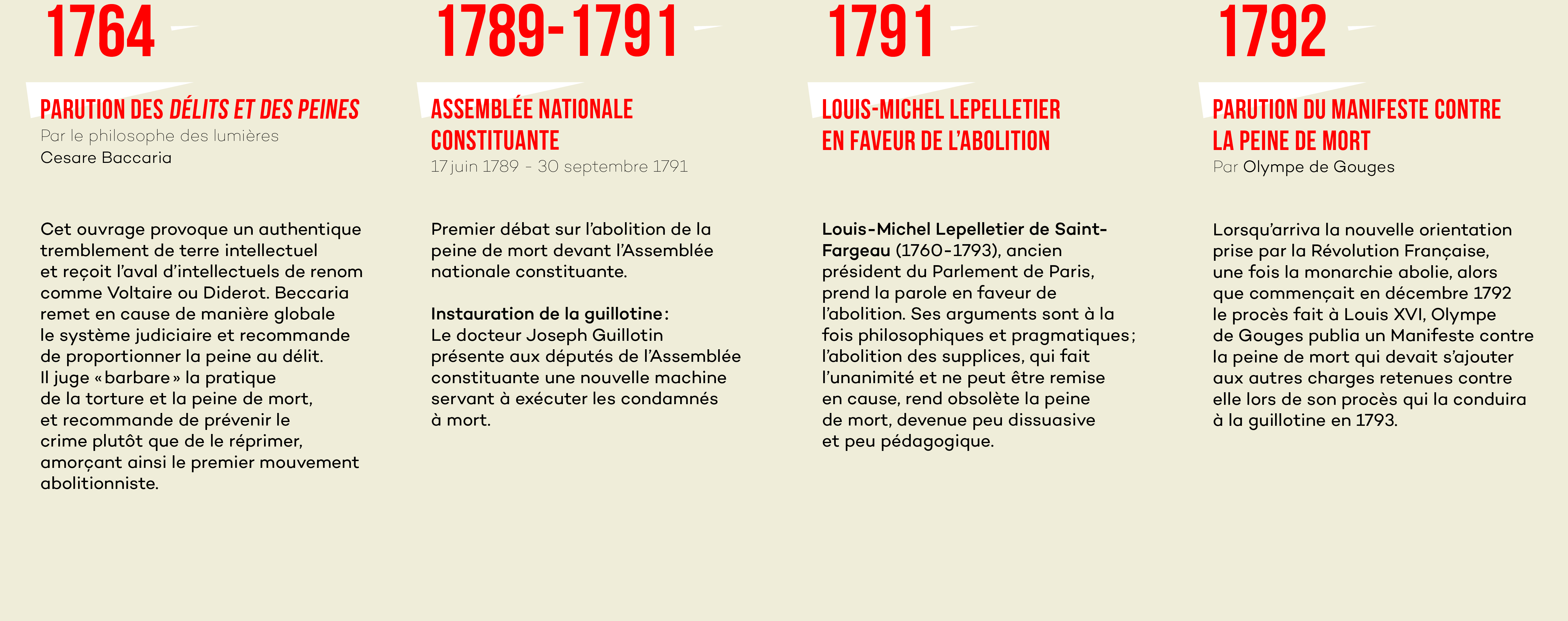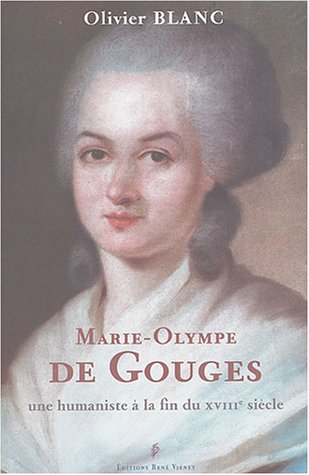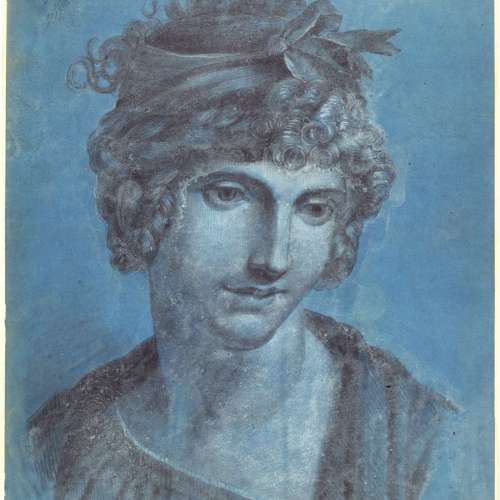12
MARIE-OLYMPE DE GOUGES
FRANCE
Dessin anonyme
Paris, musée Carnavalet
© Paris Musées
1748 – 1793
Femme de lettre, femme politique autrice de la Déclaration des droits de la femme et de la citoyenne u droit des femmes et de la citoyenneté
RESSOURCES :
-
Marie-Olympe de Gouges : une humaniste à la fin du XVIIIe siècle
-
TERREUR : Olympe de Gouges
-
Marie-Olympe de Gouges : « La femme a le droit de monter à l’échafaud, elle doit avoir également celui de monter à la tribune »
-
Kit de mobilisation : Les femmes et la peine de mort
-
Quiz
« La femme a le droit de monter sur l’échafaud ; elle doit avoir également celui de monter à la tribune »
Marie-Olympe de Gouges





Précédent
Suivant
En septembre 1791 sort un brulot signé par Olympes de Gouges. Dédié à Marie-Antoinette, « la première des femmes », il ne s’agit rien de moins que de la publication de La Déclaration des droits de la femme et de la citoyenne. Olympe de Gouges y prône l’émancipation féminine via l’égalité des sexes, Révolution au cœur même de la Révolution, et elle engage la République à considérer la femme comme une citoyenne à part entière. Abolitionniste, Olympes proclame cette égalité jusque dans la mort, ou plutôt, elle se sert de la sanction capitale pour dénoncer l’injustice de son sexe. Ainsi est rédigé l’article 10 de sa Déclaration : Nul ne doit être inquiété pour ses opinions même fondamentales. La femme a le droit de monter sur l’échafaud ; elle doit avoir également celui de monter à la tribune ; pourvu que ses manifestations ne troublent pas l’ordre public établi par la loi.
Olympes de Gouges a rejoint les Girondins. Elle continue son combat que nous qualifierions aujourd’hui de féministe, toujours dans une démarche de justice. Ainsi, convaincue que les femmes doivent jouer un rôle dans les débats politiques, et notamment peser sur les plus grandes décisions de justice, elle propose à la Convention d’assister Malesherbes dans sa défense du roi Louis XVI, au nom de son combat pour l’abolition de la peine de mort C’est contre la sanction capitale qu’elle se propose comme avocate du citoyen Louis Capet. Ainsi le 16 décembre 1792, la lettre qu’elle a envoyé à l’Assemblée nationale à l’attention des députés, est lue avant le début de la séance du jour : « Citoyen Président, l’univers a les yeux fixés sur le procès du dernier roi des Français. Je m’offre pour être la défenseuse de Louis. Je le crois fautif comme roi, mais dépouillé de ce titre proscrit, il cesse d’être coupable aux yeux de la République. Il fut faible, il fut trompé, il nous a trompés, il s’est trompé lui-même. Il ne suffit pas de faire tomber la tête d’un roi pour le tuer. » Sa demande est rejetée au motif qu’une femme ne peut assumer une telle tâche. Mais elle fait placarder des affiches dans Paris « Olympes de Gouge, défenseur officieux de Louis Capet ». Outre les moqueries des députés, elle essuie une agression à son domicile : des sans-culottes la sortent de chez elle et la molestent. Elle ne reste en vie cette nuit-là, que grâce à son humour. Alors qu’un homme réclame 24 sous pour lui trancher le cou, à moitié dénudée par le groupe, elle déclare spontanément « Mon ami, je mets la pièce de 30 sous et je vous demande la préférence. » Elle est relâchée, n’ayant à payer que l’écu.
Louis XVI est moins chanceux, il est guillotiné le 21 janvier 1793.
Toutefois, Olympes va subir un sort identique. Il ne s’agit que d’une question de mois. Arrêtée le 20 juillet 1793 pour avoir rédigé un placard fédéraliste à caractère girondin, Les Trois Urnes ou le Salut de la Patrie, elle est jugée le 2 novembre. Elle tente un dernier subterfuge : se déclarer enceinte, afin de gagner du temps. En effet les femmes n’étaient exécutées qu’après leur délivrance. Fouquier-Tinville refuse l’argument et Olympes de Gouges est exécutée dès le lendemain. Le 3 novembre 1793, aux alentours de 17 heures, elle monte sur l’échafaud place de la Concorde. Les témoins font état de sa dignité qui impressionne. Elle s’écrie avant d’être basculée sous le rasoir national, « Enfants de la Patrie, vous vengerez ma mort ! »
Marie-Olympe de Gouges, veuve Aubry, 45 ans, inspire ce commentaire une semaine plus tard dans le Moniteur universel. Journal de propagande montagnarde, l’auteur sans ironie exprime à quel point les droits de la citoyenne qu’Olympes avait tant défendus, ne sont pas prêts d’être entendus : « Elle voulut être homme d’Etat. Il semble que la loi ait puni cette conspiratrice d’avoir oublié les vertus qui conviennent à son sexe. »
Marie Bardiaux-Vaïente
- livre

Marie-Olympe de Gouges : Une humaniste à la fin du XVIIIe siècle
Auteur : Olivier Blanc
Date de parution : 2003
Éditeur : René Vienet
Nombre de pages : 270
Out of the Shadows demonstrates the importance of the role of women in the French Revolution. It traces the growth of female political awareness and depicts the determination of women of the working class to participate in the life of the new nation despite their government’s obstinate denial of the rights of citizenship. The author examines in detail the grassroots involvement of women in the affairs of the country right up until the avalanche of repressive legislation passed in the spring of 1795.
- film

TERREUR : Olympe de Gouges
Réalisé par Sylvie Pascaud
Durée : 54 minutes
Sortie : 2014
« La femme a le droit de monter sur l’échafaud ; elle doit avoir également celui de monter à la tribune. » (Déclaration de la femme et de la citoyenne, Olympe de Gouges, 1791). Abolitionniste, pionnière du féminisme, architecte d’une armature sociale, auteur de théâtre, elle est profondément humaniste. Prise dans l’engrenage de la Révolution Française basculant dans la Terreur, elle en devient la victime. Celle qui voulait avoir cent yeux, cent oreilles et cent bouches pour tout voir, tout entendre et tout raconter est là aujourd’hui, bien vivante. Dans la nuit qui précède son procès, depuis la prison où elle est enfermée, Olympe questionne ce qui a conduit l’Homme à la Terreur. L’antichambre de la mort devient son lieu des réminiscences scandées par le sifflement de la guillotine. Elle retrouve l’écrivain Louis-Sébastien Mercier qui tente de la convaincre désespérément d’arrêter son activité politique. Elle écrit une dernière lettre à son fils. Elle est guillotinée le 3/11/1793.
- podcast
Olympe de Gouges : « La femme a le droit de monter à l’échafaud, elle doit avoir également celui de monter à la tribune » – Ép. 2/10 – La Nuit des féminismes 1/2 : Quelques pionnières… (franceculture.fr)
- Kit de mobilisation
Kit de mobilisation : 19e Journée mondiale contre la peine de mort 10 octobre 2021 « Les Femmes et la Peine de Mort » Coalition mondiale contre la peine de mort
- Quiz


